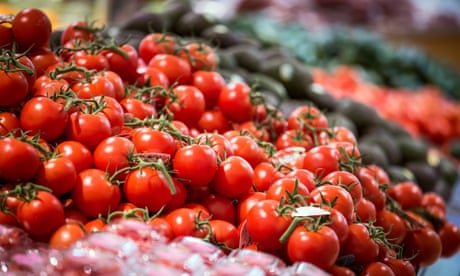- by foxnews
- 23 May 2025
Australia ‘ill-prepared’ for food insecurity driven by war and climate crisis, former defence leaders say
Australia ‘ill-prepared’ for food insecurity driven by war and climate crisis, former defence leaders say
- by theguardian
- 28 Jun 2022
- in news

Australia is badly prepared for food insecurity fuelled by the climate crisis and war, former military leaders have warned.
A new report, to be released on Tuesday, describes Australia and the Asia-Pacific as a "disaster alley" for climate change, but says governments in Canberra have not properly planned for the impact of "cascading and compound events".
The report, by the Australian Security Leaders Climate Group, cites predictions that 2C of warming may see south-east Asia's crop production decline by one-third per capita by 2040.
It says small island developing states in the Pacific are especially vulnerable to the effects of drought and flooding on food production.
Ahead of the report's release, the former Australian defence force chief Chris Barrie said a rapidly heating planet "fundamentally threatens our ability to secure our food and water supplies".
"It is clear that a lack of food - driven by war, climate change or a combination of both - can destabilise and lead to even more conflict," Barrie said.
"Food insecurity is a growing crisis brought into the spotlight by the invasion of Ukraine, and it is a crisis that Australia is ill-prepared for."
Neil Greet, a former colonel in the Australian army, said Australia needed to prepare for "big consequences" from climate change. These would include disruptions to Australia's own food growing systems.
More broadly, Greet said food insecurity in the region would "drive political instability, conflict, and people displacement in ways that will significantly impact on Australia and the security of its people".
The prime minister, Anthony Albanese, has accepted that the climate crisis poses national security risks and has promised to launch a climate security threat assessment.
This work will be overseen by the intelligence chief Andrew Shearer, but with input from other agencies including the Department of Defence.
Greet said the terms of reference for that assessment should include "an examination of the threat posed by climate change to our food, water, agricultural systems and supply chains".
Barrie and Greet are executive members of the Australian Security Leaders Climate Group, which notes that food scarcity has already become a contributing factor to major conflicts around the world, including the Syrian civil war.
The group's executive members also include Cheryl Durrant, a former director of preparedness and mobilisation at the Australian Department of Defence, and John Blackburn, a former deputy chief of the royal Australian air force.
Its report argues the world's "failure to address the root causes of climate warming will result in great pressure on the Australian defence force and emergency and disaster relief agencies to pick up the pieces in the face of accelerating climate impacts".
It urges Australia to adopt an accelerated path to net zero emissions, while also pushing for greater global ambition to tackle the climate crisis.
Australia should work "with big and small Asia-Pacific governments to build alliances for climate action" and coordinate globally "to prevent irreversible tipping points".
The report says the climate crisis "should be a primary focus of both economics and politics in Australia, with clear commitments to mobilise the resources necessary to address this clear and present danger".
"Australia and the Asia-Pacific region are a 'disaster alley' for climate change, with more than half the world's population, low-lying small-island states, and most of the large cities vulnerable to sea level rise," the report says.
It says the Coral Triangle, which includes Indonesia, the Philippines, Malaysia, Papua New Guinea, Solomon Islands and Timor Leste, contains three-quarters of the world's reef-building corals and more than a third of the world's coral-reef fish species.
"Nations in the Coral Triangle face the loss of their coral systems, the region's most populous nations - India and China - will face increasing chronic water insecurity, and more extreme heatwaves will become unbearable in South and Southeast Asia," the report says.
"The consequences for Australia will be enormous: displaced people and nations, the economic impacts on major trading partners, supply chain disruption, geopolitical tensions, the need for more development support, and increasing demands for humanitarian aid and disaster relief."
The report also suggests that Central Asian countries, including Afghanistan, face the risk of "increasingly dire water insecurity and internal displacement" while regional conflict over water rights "is possible in this strategic zone that stretches to Iran".
The report urges the Australian government to boost the capacity of near neighbours to withstand climate change-driven food shocks and their security consequences.
Australia could help deploy "a monitoring system to identify potential food insecurity hotspots, and commit to a programme to enhance food production capacity and resilience in the region".
Within Australia, the report warns that more extreme weather events and unpredictable impacts on food production would lead to more price and supply volatility. It says Australia's supply chains "are precarious, being a geographical distant island in a hyper-connected global economy".
In March, a separate report by Farmers for Climate Action predicted that empty supermarket shelves would become a more frequent sight for Australians.
The new agriculture minister, Murray Watt, told Guardian Australia earlier this month that he was open to the idea of a national food strategy, as governments globally grapple with food security and supply chain issues.
- by foxnews
- descember 09, 2016
United Airlines flight returns to Hawaii after concerning message found on bathroom mirror; FBI investigating
United Airlines Flight 1169 to Los Angeles returned to Hawaii after a "potential security concern" aboard the plane. The FBI and police are investigating.
read more


